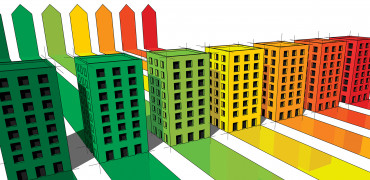Having just spent four days in the south of France meeting some of the most influential and important people involved in building our future, I thought it worth a quick blog to highlight why this annual networking exhibition has become such a vital event in the environmental calendar.
This year, an estimated 26,000 attendees from across the globe visited the exhibition area, networking events and conference sessions to discuss how we can build a sustainable future together.
MIPIM brings together investors, corporations, local authorities, manufacturers, industry and logistics with real estate professionals, to focus on property investment, developments and trends across the globe.
These are some of the world’s most influential players across the different property sectors – from office and residential, to retail, leisure, healthcare, hospitality, sport and industrial.
By 2050, more than 60% of the world’s population will be urban-based
What will cities look like in 2050?
This year’s central theme was 'Mapping World Urbanity', which sought to explore the future of urban living and look at how these changes affect the property industry by posing three simple questions:
- How will we live in cities in 2030/2050?
- What will the new rules for investment and property development be in a world dominated by cities?
- What are the best strategies for building future cities in a globalised world?
The United Nations predicts that the world’s population will be 8.5 billion by 2030 and by 2050, this will have increased to 9.7 billion.
By then, more than 60% of the world’s population will be urban-based and on middle-class incomes. We will also see an increase in life expectancy. This means that over 90% of expected growth in consumption will come from city-dwellers.
For the industry constructing and servicing the built environment, this poses major challenges as we will need to cope with this growth in urban populations and do so in a sustainable way, so that we can provide the housing, offices, leisure and infrastructure that people want and need.
Lessons for all
There were over 100 countries represented at MIPIM and delegations from more than 500 cities.
From the UK’s point of view, there were 2,401 delegates which was up over 10% from last year, making the UK one of the largest delegations at this increasingly important event.
Speakers came from across the globe but all had a common theme of how to achieve this growth in urban development while also doing all we can to tackle climate change.
Amongst the international speakers was Turkey’s Minister for the Environment and Urbanisation, Mehmet Ozhaseki, who said his country is now totally focused on its environmental strategy, especially with regard to cities. “The primary problem is the urban environment, which emerged as a result of unauthorised and unplanned housing construction.”
He added that Turkey has recently launched its ‘My Environment is You’ and ‘Zero Waste Project’ initiatives.
Raymond Johansen, the Mayor of Oslo is quoted as saying: “We are responsible for 70% of CO2 and climate change is visible. We have to act. We cannot let the next generation be responsible for the problem.”
The answers are already here
I’ve already written about the UK Government’s ambitious 25 year environmental plan with a Policy Paper called ‘A Green Future: Our 25 Year Plan to Improve the Environment' which has received both a warm welcome and wide criticism for not going far enough.
What is quite clear though is that we are entering an age where energy use will come into focus as never before and this is where I believe our industry has such an important role to play – and why we make MIPIM such a focus for the company.
Whatever our cities and towns look like in the future we have to reduce the need for energy consumption in the buildings we will use – whether old or new.
We already have the skills and technology to do this through better insulation, modern building techniques and materials, and equipment that is available now and can be widely applied, such as heat pumps.
We then need to use whatever energy a building needs as efficiently as possible and again, we as an industry are able to provide the skills and technology right now to make a real difference.
Finally, we need to continue growing the amount of primary energy we get from low or zero-carbon technologies, which we have already started to see over the past year, with days when renewable energy has been the largest contributor to the grid.
That’s what we call our ‘Lean, Mean, Green’ approach.
More to be done
Of course there are other things that we can do, both as businesses with better management of energy use, and even on an individual basis, if we all act a little more responsible in our own personal energy use.
We will also see new technologies emerge such as on-site battery storage which will help alleviate demand on the grid and provide a store for the renewable energy that buildings with photovoltaics or wind turbines produce.
Cities will also become 'smarter' with heat and electricity flowing in both directions, based upon where it is needed and how it is being produced.
There was more discussion this year about consuming services rather than owning assets, such as built-to-rent developments for living; flexible models of using office space; and transport acquired as a service when it is needed.
However, we can’t simply sit back and wait for a silver bullet to arrive as there isn’t one simple answer and it will take a co-ordinated approach from industry, government and consumers to build a sustainable society without doing any more damage to the planet.
For me, that was the overriding message I took from MIPIM and I found it encouraging to see so many from around the globe mirroring that message and taking it back to their own communities.
Martin Fahey is Head of Sustainability & Commercial Business at Mitsubishi Electric and coordinator of the company’s Green Gateway programme.



